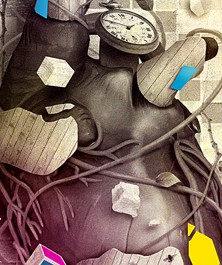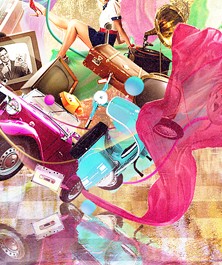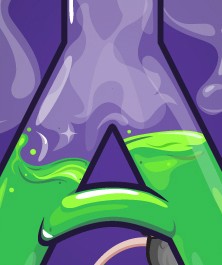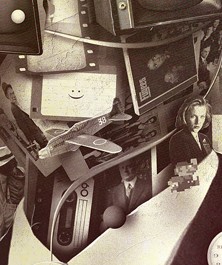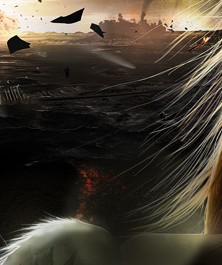Artist Interviews
- XXXI Gabriel Simonds
- XXX Vigan Tafili
- XXIX Parker Gibson
- XXVIII Courtney Wooster
- XXVII Brandon Spahn
- XXVI ricardo juarez
- XXV Daniel Kong
- XXIV Willis Kingery
Spotlight
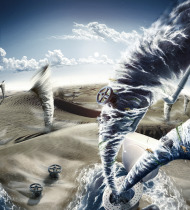 So clean
by Matteo Della Chiesa
View image
So clean
by Matteo Della Chiesa
View image Support Evoke
The Interview
Ted Yavuzkurt:
{1}
Who is Berthjan Achterop?
Berthjan Achterop:
Well, I was born in Assen, a small city in
the Netherlands. I grew up in Bovensmilde, which is a
really small village in the north of Holland. Later on I
studied Communication and Multimedia Design in Leeuwarden
which I passed in 2007. After that I got a
job as a corporate webdesigner in Groningen (where I live
nowadays). Today I'm still working for that agency. In my
free time I do a lot of design stuff. Also
after a day at the office I really love to lift weights.
Clears my mind every time! In the weekend I go out with
my friends and girlfriend (how original ?).
Ted Yavuzkurt:
{2}
Tell us a bit about how you got started in digital art
and where you plan to go with it. How does it
feel to be featured artist?
Berthjan Achterop:
I think it all started as a kid, I always enjoyed reading
comic books like Spiderman. The drawings and the emotions
that it contains really impressed me.
Since then I became interested in the art and design
thing. I always liked to draw in my teen years. Most
where cartoonish and comic like drawings. When I was
20 years old, I started Communication and Multimedia
Design. I think I was 20 or 21 when I first worked with
Photoshop. Most were little experiments and
small stuff, sometimes I made partyflyers to earn some
money. I wasn't into the grapic design scene at all at
that moment.
After finishing school I got a job as a corporate
webdesigner. It was fun, but it was also another branch
of design. I began to miss the more free
creative work. So I began making free work after my job
to still my creative hunger. Not really graphic design
with concepts, more doodles and little
experiments. But my colleague Sumeco was really into the
graphic design scene at that moment. And I was amazingly
impressed of his work. He told me a lot
about graphic design and his work. He was a big
inspiration for me. From that moment I began my first
more serious work (which is not the kind of work you
finish within three hours ?) . I was 24 at that time. I
really enjoyed making bigger complicated pieces. Most of
the time I finished something, Sumeco gave me
some feedback to improve. Later on I was searching a way
to improve and to get inspired by other artists. That was
one year ago, it was the same time I joined
Evoke. It's not that I have a specific goal with my free
work at this moment, it's just so much fun to do and it
is a good way to express yourself and your
creativity. When working on a piece you come to yourself
which is a good thing and is rewarding enough for me.
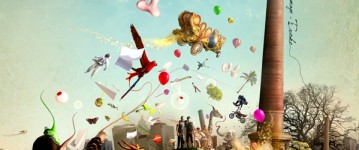
Ted Yavuzkurt:
{3} Being 27, you are one of the older members in Evoke.
Do you think those extra few years give you a different,
wiser perspective on things? If so, how?
Berthjan Achterop:
Well, fighting in the Vietnam war gave me a lot of
inspiration. But to be honest.. no. I think technique is
always relatively easy to achieve for everybody,
young and old. Of course the concepts and thoughts behind
the artworks are different. Someone in his 30s has
different issues then a 16 year old. So they have
different themes and concepts.
Ted Yavuzkurt:
{4} You've been a member of Evoke for about a year, has
this changed you as an artist at all? How do you feel
about the online artgroup scene in general?
Berthjan Achterop:
I really love the artgroup scene, it gives you so much
inspiration and ideas. It certainly affects me. It's
really cool to see how the themes are interpreted
in so many ways. I get inspired by the other artists and
the way they work and I really appreciate the feedback
you receive to get better each time.
Ted Yavuzkurt:
{5} How would you describe your style? You seem to be
able to capture perfectly many different types and facets
of digital art in your works. How is it that
you are able to show such mastery over such a broad range
of techniques?
Berthjan Achterop:
Hmmm, I don't think I have a specific style. But I like
to use a lot of techniques and combine everything. In
real life I'm pretty impulsive and try lots of
new things, I guess it's the same with my work. That's
what I really like in digital art, there are no
boundaries or whatsoever. You can combine tons of style
elements and techniques to express your ideas. It creates
a lot of freedom. With practice and reference I picked up
the techniques.
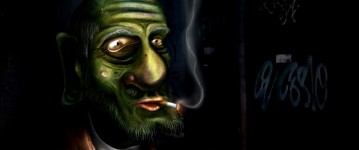
Ted Yavuzkurt:
{6} How have you developed as an artist over time? What
is the most useful thing you have ever learned while
developing your current style and technique (this
doesn't necessarily have to be something you learned in
an art class or something, it can be anything)
Berthjan Achterop:
I think using good references. When I paint for example
skin, I use a few skin pictures to see how it looks. Over
time I put more effort in each work.
Consequently I gained a lot more experience in the
different techniques.
from the crowd, make
your work personal...
Ted Yavuzkurt:
{7} Do you have any suggestions for new artists trying to
develop yet stick out from the crowd?
Berthjan Achterop:
Perhaps, if you want to stick out from the crowd, you
have to make your work personal and try to be original. I
find it really hard to make suggestions, it
depends on so many factors.
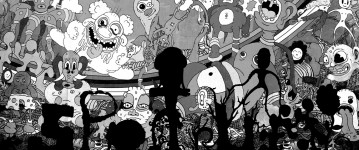
Ted Yavuzkurt:
{8} What inspires your work? Is it music, other artists,
nature, or just random inspiration?
Berthjan Achterop:
It's different every time. Some pieces have concepts,
like paradox of freedom
(
[link]
). I was having some personal issues about making
decisions when I was creating this.
Other pieces are less conceptual, like Dutch apocalypse
(
[link]
) this was totally
inspired by Mad Max and Fallout. I loved that game so
much, the 50s propaganda, the style elements, the black
humour and so much irony. I though it was kind
of cool to make a fallout setting in my own country.
I guess everything can be an inspiration
Ted Yavuzkurt:
{9} How do you go from conception to execution? Your
pieces all show a thorough conceptual basis, yet they are
flawlessly executed. Many artists either have
awesome technique but no conceptual underpinning, or they
have all concept with little ability to express it
effectively. What sets you apart in this regard?
Berthjan Achterop:
It depends on the project. Most of the time I have some
sort of mood in my head which I want to achieve. I make
a rough sketch. Then I'll find/ draw/ model
the elements which I need. After that I'll make a rough
composition. When it's finished the finetuning begins.
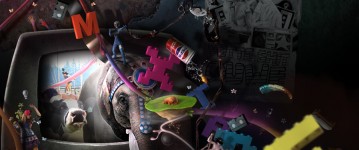
Ted Yavuzkurt:
{10} Walk us through the creation of a typical work. How
long does it take? What does your environment look like?
Do you sketch it first or just start
cracking at it? When you work are you "in the zone" or is
your mind free to go where it pleases?
Berthjan Achterop:
Every work has its own timepath. It's very hard to say
how much hours I put into a piece. Most of the time I'll
come back from my work, eat, train and then do
graphic design for an hour or two. So I really don't know
how much time I spent on one piece, but I guess about 8
till 25 hours or something. You can go on
forever but there is a moment when you lose motivation
and you need to finish it. If it's a work with a good
concept the motivation last longer. The inspector
spectrum piece for example is all brushed by hand. It
takes a while before it looks nice. You can go on
forever, put more details in it every day but after a
while it gets a little bit boring, working on the face
for two hours a day, so then I'll finish it.
will have diff. concepts
than a 16 year old...
Ted Yavuzkurt:
{11} What tools do you find most necessary to work - this
can be hardware, software, or anything else.
Berthjan Achterop:
I work with fireworks for vector (I can't get along with
illustrator very well, fireworks really speed things up
for me), photoshop for bitmap, 3dsmax/ cinema
for modelling. And I couldn't do it without my wacom.
It's the best thing what happened to me since 2007.
Especially when you brush a lot, it looks so much
nicer and you spare a lot of time.
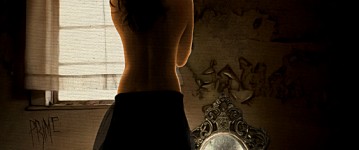
Ted Yavuzkurt:
{12} "Corporate Braindamage" (
[link]
) is
an INSANE piece. So many details and pieces working
together effortlessly. What inspired this work?
How did you pick and choose just the right details to
add, as well as what to take out to make this a finished
product? New artists always have a lot of
trouble deciding what should go in a work and what
shouldn't, so how do you always nail it?
Berthjan Achterop:
Sometimes in my line of work there is not much room for a
lot of creativity. Most of the things I make are
restricted which sometimes gives me a feeling of
frustration. That is the main idea of this piece. It's
about unused creativity. For this peace I wanted to
achieve a happy circus mood with a strange twist.
The elements itself are standing for creativity. So
finding the elements was relatively easy. When you have a
mood in your head it’s not that hard to find the
right elements.
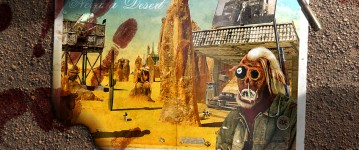
Ted Yavuzkurt:
{13} What work are you most proud of?
Berthjan Achterop:
Paradox of freedom, not for the execution but for the
concept
Ted Yavuzkurt:
{14} Lastly, here is Dalla's famous top ten quiz:
1. Favorite Food?
Sushi
2. Do you think you're sexy?
sure
3. Pepsi or Coke?
Coke
4. What's your favorite gaming console?
Xbox 360
5. Favorite band or musical artist?
Very wide range
6. Blonde or Brunette?
Brunette
7. If you could live anywhere in the world,
where would it be?
Hawaii
8. Favorite Sport?
Weight lifting
9. Mac or PC?
PC
10. What is your current homepage?
Google.nl
Ted Yavuzkurt:
{15} Do you have any final thoughts or advice for us? Perhaps
a quote, a sentence, a message, anything.
Berthjan Achterop:
Picasso said: All children are artists. The problem is
how to remain an artist once he grows up.

